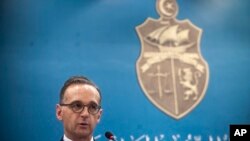Germany's foreign minister arrived in the eastern Libyan city of Benghazi on Thursday and met with one of the country's rival leaders in a bid to push forward troubled efforts to secure a cease-fire in the North African country.
Foreign Minister Heiko Maas extended an official invitation to Libyan Gen. Khalifa Hifter to attend the upcoming conference in Germany, according to a military spokesman with Hifter's forces.
The gathering in Berlin on Sunday is trying to bring together many of the countries that have interests in Libya's ongoing civil war.
Since the 2011 ouster and killing of Libya's longtime dictator Moammar Gadhafi, the country has sunk further into chaos and turmoil and is now divided between two rival administrations, the Tripoli one in the west and the one based in the country's east, supported by Hifter's forces.
Hifter's forces have been on the offensive since April, laying siege in an effort to capture Tripoli and battling with militias aligned with the U.N.-supported government based in the Libyan capital. Hifter claims his march on the capital aims to liberate Tripoli from a weak government that had allied itself with ``terrorist`` militias.
Meeting Maas on Thursday, Hifter agreed to attend the Berlin conference, Brig. Gen. Khaled al-Mahjoub told The Associated Press over the phone.
“Libya's main problem is well-know to the world, it lies in the existence of militias,” said Mahjoub, adding that Hifter's forces hope the Berlin conference can set a clear timetable for the dismantling of militias loyal to the Tripoli government.
The German top diplomat's trip to Benghazi, Hifter's stronghold, came two days after Libya's rival leaders left Moscow without reaching an agreement. Russia and Turkey proposed a cease-fire last week and Libyan Prime Mniister Fayez Sarraj, the head of the Tripoli government, and Hifter went to Moscow on Monday for talks with Russian and Turkish diplomats and military officials.
Sarraj and Hifter, who didn't meet directly, considered a draft document spelling out details of a truce proposed jointly by Russia and Turkey that began Sunday. Sarraj signed the draft before departing, while Hifter requested more time to consider it and then left Moscow without signing.
Maas spoke to Sarraj last week and said earlier he would meet Hifter on behalf of the European Union's foreign ministers.
“Our message is clear: no one can win this conflict militarily,'”Maas said before leaving Berlin. ``A window is now opening to free the conflict from international influence and so open the way to a political process and inter-Libyan negotiations on a post-war order'' under U.N. supervision.
“I hope that the parties will take this opportunity to put the future of Libya back in Libyan hands,” Maas added. “This now requires readiness for a real cease-fire and both parties' participation in the dialogue formats proposed by the United Nations.”
Sarraj's government says Hifter is "an aggressor" seeking to turn Libya into “a military dictatorship.” The Tripoli government wants Hifter's forces to withdraw from areas they seized since April, a demand Hifter is not expected to comply with.
Britain announced Thursday that Prime Minister Boris Johnson will attend the Berlin talks.
The conflict in Libya has escalated in recent months and threatens to destabilize the wider region,'”said Johnson's spokesman, James Slack. “This meeting is an opportunity for the U.K. to come together with international partners and countries in the region to support efforts towards a cease-fire and encourage a return to United Nations-led talks.”




